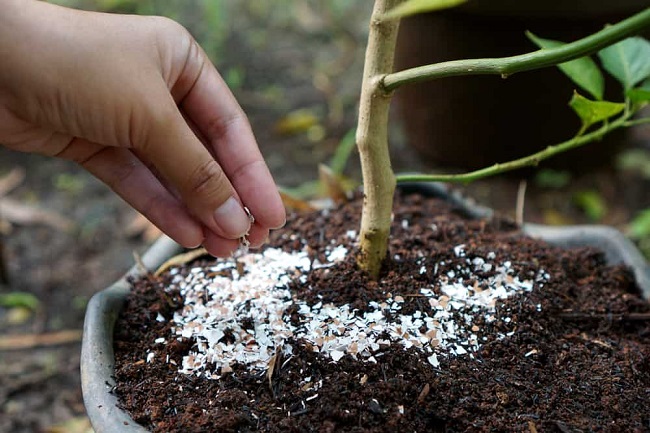
Eggshells can be used for smallish seedlings and be put directly in the ground for planting. You’ve heard of “liming” the garden and lawn, right? Most people buy a bag of lime (calcium carbonate) and sprinkle it throughout the garden. Were you aware that eggshells are 93% calcium carbonate? In addition to the calcium, the eggshells contain about 1% nitrogen, about a half-percent phosphoric acid, and other trace elements that make them a practical fertilizer.
Calcium is an essential plant nutrient which plays a fundamental part in plant cell manufacture and growth. Most roots must have some calcium at the growing tips. Plant growth removes large quantities of calcium from the soil, and over time the calcium must be replenished, so this is an ideal way to recycle your eggshells.
Crushed eggshells add valuable nutrients to soil. Calcium is especially important for fast growing plants because they deplete the surrounding soil of calcium. Egg shells should be washed before you place them in a composter or into your garden. Make sure you crush the eggshells before you add them to your garden. Egg shells that are not crushed will break down very slowly.
DIY Eggshell Fertilizer in 3 Easy Steps
Collect and save your eggshells in a container until you have enough to make a batch of fertilizer.
Clean the Eggshells
Rinse the eggshells with water to remove any remaining egg white or membrane. Let them air dry or bake them in the oven at a low temperature (around 250°F) for about 10 minutes to ensure they are completely dry.
Crush the Eggshells
Once the eggshells are dry, crush them into small pieces. You can use a food processor, blender, or a mortar and pestle to do this.
Add Eggshells to the Soil
Mix the crushed eggshells into the soil of your garden or container plants. Alternatively, you can sprinkle the eggshell pieces around the base of your plants.
The eggshells will slowly release calcium into the soil, which will be absorbed by the plants. You can repeat this process every few weeks to provide ongoing calcium supplementation for your garden.
Related Articles & Free Email Newsletter Sign Up
7 Common Types & Signs of Plant Nutrient Deficiency
Composting and Its Unintended Consequences


Comment here